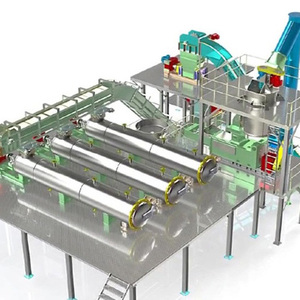Portuguese biodiesel firm develops new palm oil extraction tech

Image: IncBio
February 8, 2017
BY Ron Kotrba
Portuguese biodiesel plant manufacturer IncBio has developed a new crude palm oil (CPO) extraction technology that the company says can achieve an oil extraction rate of more than 25 percent, thereby increasing oil extraction by an additional 25 percent.
“Considering [the oil extraction rate] for the Malaysian palm oil industry was 20.1 percent in 2016, this represents a potential efficiency gain of 25 percent,” the company stated. “That is 25 percent more oil with the same fresh fruit bunches.”
IncBio says its technology also reduces water usage at traditional crude palm oil mills by 60 percent and effluent discharge by 50 percent. Also, the company says the process itself guarantees that the effluent has 0.01 percent or less of oil contamination, which removes the existence of oxidation lagoons. As a result, IncBio says palm oil mills using its new technology reduces methane emissions by 50 percent, and can be equipped with options to completely eliminate methane emissions with compost or gasification units.
The technology can be implemented in new or existing palm oil mills.
Advertisement
Advertisement
IncBio’s patented milling technology has been implemented for two years in a 30 metric ton per hour mill.
Advertisement
Advertisement
Related Stories
The USDA significantly increased its estimate for 2025-’26 soybean oil use in biofuel production in its latest World Agricultural Supply and Demand Estimates report, released July 11. The outlook for soybean production was revised down.
U.S. fuel ethanol capacity fell slightly in April, while biodiesel and renewable diesel capacity held steady, according to data released by the U.S. EIA on June 30. Feedstock consumption was down when compared to the previous month.
The U.S. EPA on July 8 hosted virtual public hearing to gather input on the agency’s recently released proposed rule to set 2026 and 2027 RFS RVOs. Members of the biofuel industry were among those to offer testimony during the event.
The USDA’s Risk Management Agency is implementing multiple changes to the Camelina pilot insurance program for the 2026 and succeeding crop years. The changes will expand coverage options and provide greater flexibility for producers.
The USDA’s National Agricultural Statistics Service on June 30 released its annual Acreage report, estimating that 83.4 million acres of soybeans have been planted in the U.S. this year, down 4% when compared to 2024.
Upcoming Events










